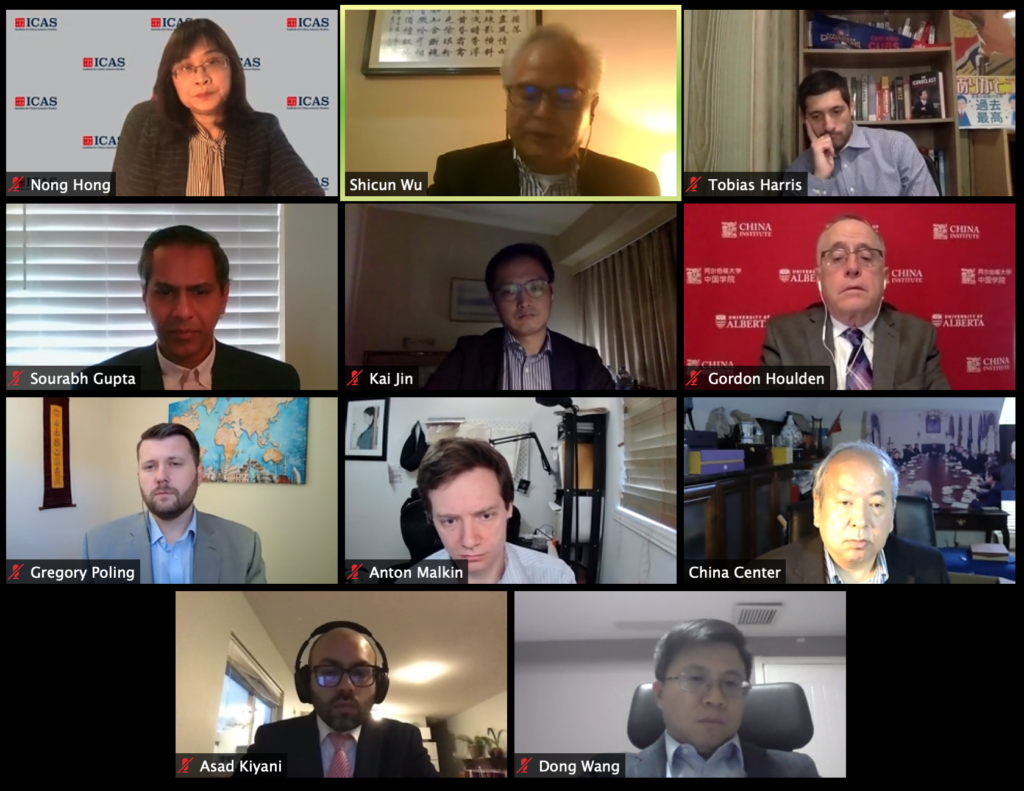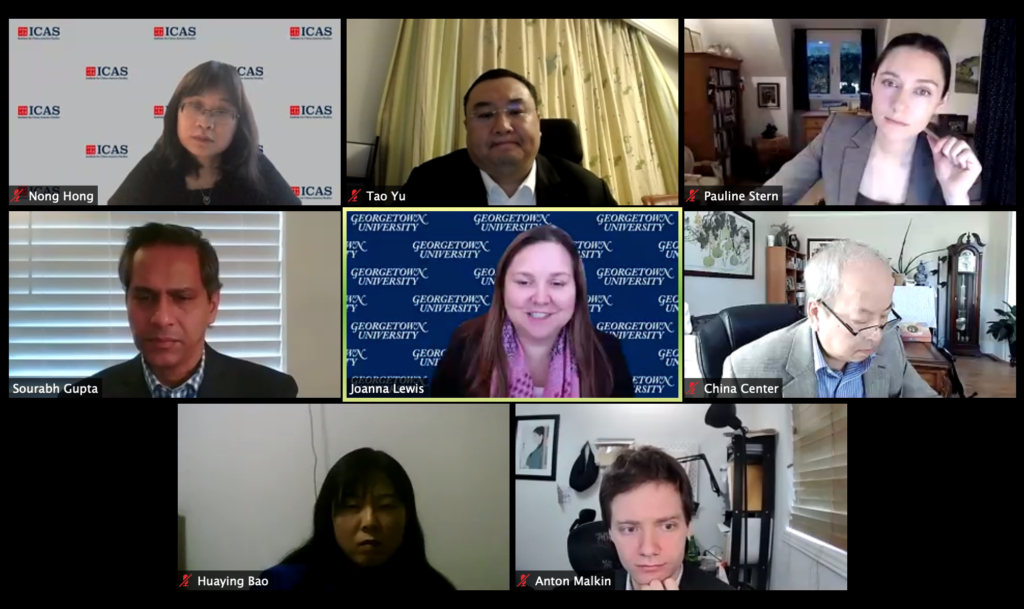Executive Summary of The 2nd China-US-Canada Trilateral Relations Roundtable Dialogue
On November 17 and 18, 2020 the Institute for China-America Studies (ICAS) held its 2nd China-US-Canada Trilateral Relations Roundtable Dialogue, virtually. Dr. Nong Hong, the Executive Director of ICAS welcomed all the participants online with a brief introductory presentation. In order to maintain a balanced perspective, both panels included participants from China, the United States, and Canada. Panel I was on the geopolitical and security implications of the US-China relationship and its impact on third parties such as Canada, Japan, North and South Korea, and the Indo-Pacific. Panel II focused on the future of global trade and science & technology policy following the US election.
Day 1 Panel: Politics and Security

The first day opened with a set of opening remarks by ICAS Advisory Board members Dr. Wu Shicun and Professor Gordon Houlden. Both discussed the significance of the current US-China relationship with regard to international peace and prosperity and the influence of third countries, such as Canada, which seeks to adjust and balance their relationships within the US- China framework. Panelists were unanimous that with the elevated bilateral tensions as an upshot of COVID-19 pandemic and the election thereafter of US president-elect Joe Biden, the next steps in the bilateral relationship is of great interest – and consequence – to not just China and the US but to countries around the world.
Prospects of US relations with Japan and Southeast Asia under a Biden administration, as well as their respective relations with China was discussed. Panelists noted that there is both hope and anxiety in East and Southeast Asia with regard to the transition in Washington. On the one hand, Biden is expected to restore a general predictability and stability in Washington’s interactions with its Asian allies and partners. On the other hand, there is anxiety that in the course of restoring a modicum of balance in the US’ relations with China, the security concerns of its allies and partners, such as the Philippines and Vietnam, could be somewhat downgraded. For their part, each of these countries seek to weave a fine balance in their relations with China too. This having been said, the domestic focus on ending COVID-19 will likely delay major changes in the region in the short term, even in areas of increased tension such as the South China Sea.
Some panelists argued that Trump’s approach to China has leaned towards a scenario of a new Cold War mentality while projecting that, under Biden, the bilateral relationship will be more manageable. That being said, the Chinese panelists believe that a Biden administration would not fundamentally change the course of US-China relations. Thus, the context of a US-China rivalry across a range of domains, such as trade, high technology and soft power, is likely to remain a consistent feature under the Biden administration too.Additionally, some posited that while Canada remains a firm US partner on security and economic issues, its significant trade interactions with China has led to a more balanced policy vis-à-vis the two major powers. They also argued that multilateral platforms provide an additional avenue for Canada to navigate the difficulties created by US-China rivalry — although the effectiveness of deploying such middle power approaches at multilateral fora remains somewhat in question.
Day 2 Panel: Trade and Science and Technology

There was a general consensus among panelists that a reset of the US-China relationship in terms of climate change and environmental stewardship is critical, although its exact contours, going forward, remains to be defined. History had shown during previous administrations that bilateral agreements between the US and China on climate change related issues is not only possible but has had quantifiably beneficial outcomes, such as the Montreal Protocol. Although President-elect Biden’s intentions to rejoin the Paris Agreement is a step in the right direction, panelists viewed it as insufficient insofar as showing the world that the US is ready to reclaim its role as a ‘green’ global leader.
On the US-China trade and economic relationship front, panelists were of the view that decoupling has not in fact been established as a new trend as a result of the trade war and COVID-19 pandemic. To the contrary, recent business surveys from the US Chamber of Commerce, newly released trade data, and the results from the Third China International Import Expo paint an altogether sunnier picture, indicating that American businesses are actually deepening their engagement in the Chinese market in numerous areas. Thus, although decoupling may continue within certain supply chains deemed critical, such as PPE (personal protective equipment) manufacturing, coupling rather than decoupling may be the likely way forward, especially with President-elect Biden likely to reverse the unilateral Trump tariffs over time. New opportunities for cooperation with China, such as with the latter’s launch of the Hainan Free Trade Port, offer greenfield areas of cooperation that could leaven bilateral economic frictions while also aligning China’s compliance with global trade rules and norms.
China’s development of its venture capital sector meantime could also play a healthy role in endowing capacity and depth to its domestic regulatory framework. This will, in turn, improve the operating environment for foreign businesses across varied commercial sectors in the Chinese market. For instance, as the venture capital sector leads China’s high-quality growth in a number of frontier areas, such as digital trade and fintech, the need for joint venture-based technology transfer frameworks will necessarily diminish. Within Canada, panelists observed that there has been a shift in policy-thinking in terms of attracting inward Chinese investment as well as the integration of Chinese technology within the Canadian technology eco-system. Given, however, that until recently it was not very well understood how Chinese technology-intensive capital was circulating within academic, research and technology communities, Canada is now increasingly monitoring the process and details of these collaborations with a keen eye.
Dr. Liu Yawei, Director of the Carter Center’s China Focus and an ICAS Advisory Board Member, provided the concluding remarks. In his remarks, he posited that just as the incoming Biden administration faces an uphill battle to renew global trust in the United States, so too does China face numerous global challenges. These include the fallout from the COVID-19 pandemic and the fact that China’s economic rise has been viewed as threatening and ill-intentioned by many. The US and Canada, within the context of the Biden administration, ought to view China’s rise more objectively, while at the same time, China ought not to attempt to fight an ideological war and be more receptive to external guidance. Doing so will allow the three countries to act in a fairer and more responsible manner, both at home and on the global stage.

